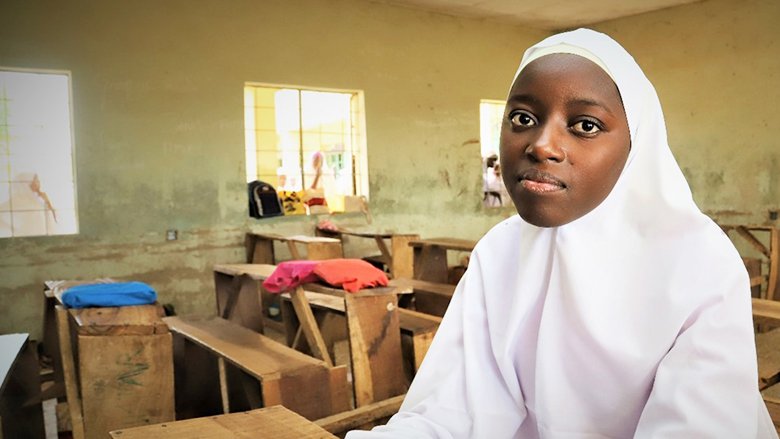Gender gaps in education are acute, especially in low-income countries and places affected by fragility or violence. According to UNESCO, girls in fragile, conflict and violence (FCV) settings are 2.5 times more likely to be out of school compared to boys. And completion rates for secondary school stand at 33% for girls compared to 38% for boys.
Fatima Auwal, a young girl from Kano State, in northern Nigeria, shared her story with a World Bank team in 2023. She was among many girls facing an uncertain future. After losing her parents, Auwal moved in with her uncle but was forced to drop out of school due to rising costs. ��There are many expenses associated with attending school��uniforms, books, footwear, food, and other necessities. I had to stop going to school when I could no longer afford them,�� she recalled.
A recent emphasizes how cultural norms, security concerns and lack of infrastructure contribute to this disproportionate impact of fragility and violence on girls�� education.
��Implementing activities [in educational settings] to address the issue of social norms is a life-changer for beneficiaries because it allows them to deconstruct the taboo around the word 'sex' and to build themselves up in terms of gender equality,�� said Josette Gaboton, in charge of teaching and pedagogy in the ongoing PROMESSE (Promoting a More Equitable, Sustainable and Safer Education) project in Haiti. The project supports gender-sensitive and inclusive teaching methods.
The negative impact of fragility on girls�� education comes with a price��for the ones whose lives are set back and for entire country trajectories. For example, according to a 2018 World Bank study, limited educational opportunities and barriers to completing 12 years of education could cost countries between US$15 and US$30 trillion in lost lifetime productivity and earnings.
To tackle these challenges, the World Bank allocates a significant portion of its education funding to supporting girls�� education.
��These challenges demand transformative solutions,�� says Ekua Nuama Bentil, Senior Education Specialist, the World Bank��s Edtech co-Lead and Gender thematic group lead in Education. ��Fortunately, interventions that promote educational technologies and bridge the digital gender divide can significantly improve educational outcomes in these challenging FCV environments. Such initiatives empower adolescents to catch up and continue their learning, while also preventing an inadvertent widening of the gender gap,�� Bentil said.
Here are some highlights of the World Bank��s support to girls�� education in challenging contexts:
- Nigeria: The (AGILE) Project, a US$1.2 billion investment, provides scholarships to girls from the poorest households who lack the financial means to enroll or complete secondary school. As the Bank��s largest initiative in education, the AGILE project is specifically dedicated to supporting adolescent girls. It benefits from financial support provided by the International Development Association (IDA) and focuses on ensuring secondary schools are safe, accessible, and inclusive for girls. A quarter of a million girls have received scholarships as a form of conditional cash transfer through the program. The project also provides a variety of life skills training for adolescent girls on digital literacy, sexual reproductive health, nutrition, menstrual hygiene management, gender-based violence awareness, climate, negotiation skills, and self-agency. Fatima Auwal, previously mentioned in this story, was fortunate to become a beneficiary, allowing her to continue her education.
- Bangladesh: The project established learning centers in camps for displaced Rohingya people to conduct informal learning activities between 2019-2021. A total of 112,000 children and adolescents were enrolled, with more than 48 percent being girls. Impressively, the project achieved close to a 100 percent retention rate in its first year.
- West and Central Africa: The (SWEDD) initiative, through a package of interventions including scholarships, subsidized school fees, uniforms and bicycles for girls, remedial learning programs and school canteens, has enabled more than one million girls to stay in school. The retention rate of teenage girls enrolled in secondary schools, thanks to the SWEDD project, is 96%.
- Haiti: The Promoting a More Equitable, Sustainable and Safer Education Project (PROMESSE) benefits approximately 150,000 students, including 69,000 girls cumulatively. The project supports gender-sensitive and inclusive teaching methods, alongside improving considerations of girls�� and special needs in school infrastructure and learning environments as well as understanding and behavior related to gender and gender-based violence. Additionally, it involves collecting and analyzing data on gender disparities in education with the goal of implementing interventions to reduce these gaps and build resilience in the education sector. These efforts aim to foster equal opportunities for all students, particularly girls, in the fragile socio-economic context of Haiti.
ľ��ӰԺ's commitment to girls' education is unwavering, especially in fragile, conflict affected settings. Educated girls are the seed of success for every country. By investing in education and addressing the multifaceted barriers that girls face, the World Bank aims to create a more inclusive, equitable, and prosperous future for all. In this respect, funding from (IDA) is crucial in transforming the lives of girls in settings affected by fragility, conflict and violence, providing them with the opportunities and support they need to thrive and prepare for a brighter future despite the challenging circumstances.


